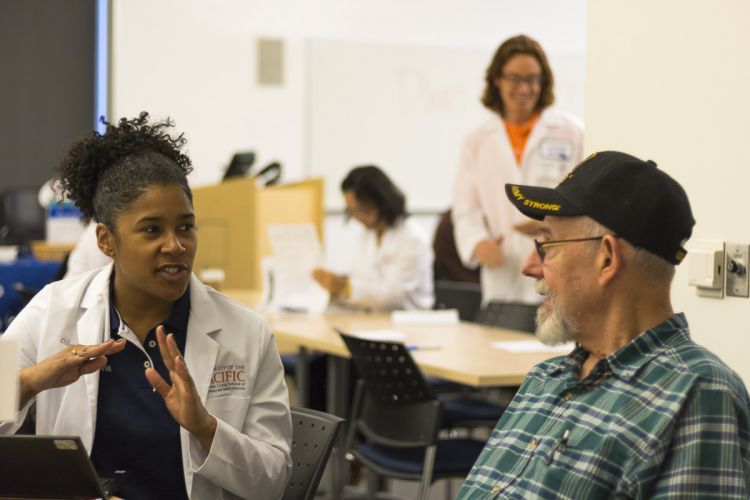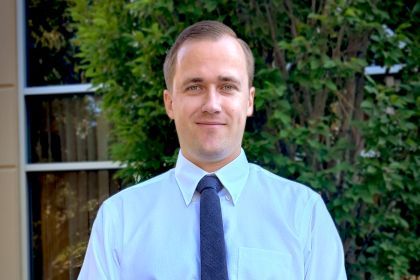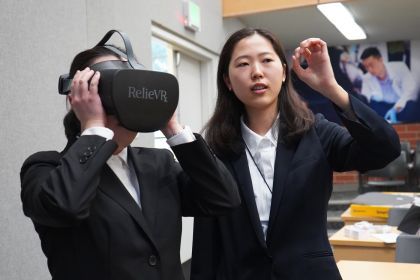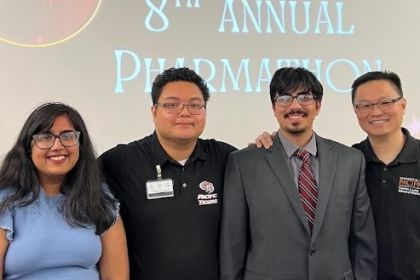Breadcrumb
Pharmacy faculty and students invest in local community health

Pacific's Medicare Clinics aim to help community members on Medicare evaluate all Part D prescription drug plan offerings to identify the one that will help minimize out-of-pocket prescription drug costs
University of the Pacific's Thomas J. Long School of Pharmacy continues to shine in serving community needs, as faculty and students continue to go outside the walls of the university through various programs to provide health services to the community
"We have a responsibility to support the health of our local community," explained Rajul Patel ’01, ’06 pharmacy professor at Pacific. "Especially being in the Central Valley, where there is a dearth of health care providers, we need to provide health care services to our neighbors through our community outreach programs."
One of the community programs established by the School of Pharmacy is the Mobile Medicare Clinics. Founded in 2007 following the creation of the Medicare Part D prescription drug benefit, the Medicare Clinics aim to help community members on Medicare evaluate all Part D prescription drug plan offerings to identify the one that will help minimize out-of-pocket prescription drug costs. In addition, community members can receive a comprehensive review of all of their medications to ensure optimal use from their medications by actively managing drug therapy and by identifying, preventing and resolving medication-related problems. Pacific faculty built a classroom to community model to educate students on the details of the Medicare Part D benefit and how to perform Medication Therapy Management (MTM) services and then hosted health fairs to create an environment for students to utilize their gained knowledge and skills to serve the needs of the community.
Prior to this year, the program had assisted 8,686 beneficiaries helping them save an estimated $8.77 million in out-of-pocket prescription drug costs. The Clinics have expanded since its inception to offer 12 different health screenings and services including immunizations, diabetes and blood pressure checks, bone density testing, and mental health screenings.
"Through this program, our pharmacy students get real-world experience where they are able to take the knowledge they learn in the classroom and then apply it to impact the needs of the community," said Patel. "Students also learn how to effectively communicate with patients and better understand their needs."
Due to the COVID-19 pandemic, the Clinics had to pivot to a telehealth platform this year. The school hosted 10 virtual health fairs during which 811 patients were served by student pharmacists and pharmacist volunteers and provided Part D review and MTM services.
"We actually found some advantages to transitioning our health fairs to a telehealth model," said Patel. "We were able to provide services to patients from eight different states and Washington D.C., which we would not have been able to do if we were only in-person."
Another program the School of Pharmacy has been involved with is the National Prescription Drug Take Back Day. In collaboration with San Joaquin County Public Health Services, San Joaquin County Opioid Safety Coalition, San Joaquin County Sheriff’s Office, Lathrop Police Services and the U.S. Drug Enforcement Administration, the School of Pharmacy worked to provide the public an opportunity to prevent pill abuse and theft by ridding their homes of potentially dangerous prescription medications, including opioids.
“Rates of prescription drug abuse in the United States are alarmingly high, as are the number of accidental poisonings and overdoses due to these drugs,” said Adam Kaye, pharmacy professor at Pacific. “We need to do everything in our power to make our homes and communities as safe as possible and protected against poisonings.”
Pacific's School of Pharmacy students also do extensive community outreach through numerous student groups that work with different communities and focus on underrepresented groups. Pharmacy student groups include Salud Outreach, Black Barbershop Health Outreach Program, Mental Health Awareness Committee, Operation Immunization, and Vietnamese Cancer Awareness, Research & Education Society (VN CARES) among others.
"These experiences are great for our students to see that patients are just regular people who need their support in best taking care of their health," said Patel.
Below are some testimonials from individuals who have received support from Pacific student pharmacists during this year’s virtual Mobile Medicare Clinics.
“Seniors often feel lonely and lost and there aren't many services for us. When there is someone who can counsel us, they seem to have a limited amount of time and energy and perspective. Whereas here, you get a lot of individual attention from young people who have a lot of energy and know-how and they have a mentor who can help them with anything that they don't know. This is actually meeting a need on both sides. It is making the pharmacist more capable of seeing the full humanity of the people they are serving and allowing the people they are serving to feel their humanity and to feel seen.”
“All of the students that helped us were wonderful, very thoughtful and patient. The young lady that helped with us Medicare drug benefit was great. She took a lot of time educating and explaining things, and we got a new drug plan that will save us a bunch of money. Thank you for having this event, we enjoyed ourselves very much.”
“I realized as I was gathering papers together to come to this, that it is such a blessing to have something like this where someone can help us figure out how to get through the maze. Because there is an aspect of Medicare that has a maze feeling to it and there is some anxiety that one might get lost in it. So, to have people who have experience knowing how to trace it through and the fact there is often more than one person there helping ... I was so relieved.”





